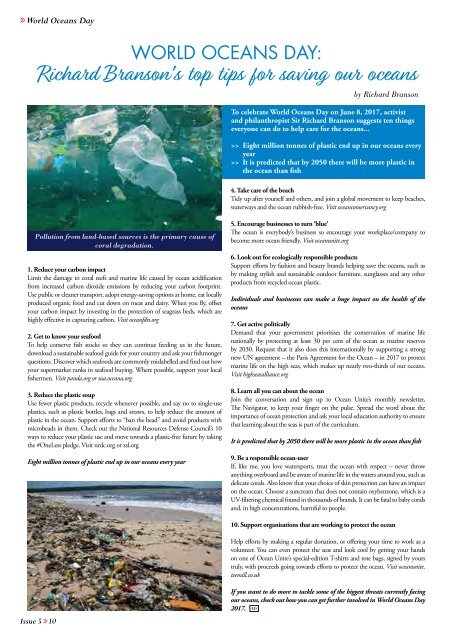You also want an ePaper? Increase the reach of your titles
YUMPU automatically turns print PDFs into web optimized ePapers that Google loves.
World Oceans Day<br />
WORLD OCEANS DAY:<br />
Richard Branson's top tips for saving our oceans<br />
by Richard Branson<br />
To celebrate World Oceans Day on June 8, 2017, activist<br />
and philanthropist Sir Richard Branson suggests ten things<br />
everyone can do to help care for the oceans...<br />
>> Eight million tonnes of plastic end up in our oceans every<br />
year<br />
>> It is predicted that by 2050 there will be more plastic in<br />
the ocean than fish<br />
4. Take care of the beach<br />
Tidy up after yourself and others, and join a global movement to keep beaches,<br />
waterways and the ocean rubbish-free. Visit oceanconservancy.org<br />
Pollution from land-based sources is the primary cause of<br />
coral degradation.<br />
1. Reduce your carbon impact<br />
Limit the damage to coral reefs and marine life caused by ocean acidification<br />
from increased carbon dioxide emissions by reducing your carbon footprint.<br />
Use public or cleaner transport, adopt energy-saving options at home, eat locally<br />
produced organic food and cut down on meat and dairy. When you fly, offset<br />
your carbon impact by investing in the protection of seagrass beds, which are<br />
highly effective in capturing carbon. Visit oceanfdn.org<br />
2. Get to know your seafood<br />
To help conserve fish stocks so they can continue feeding us in the future,<br />
download a sustainable seafood guide for your country and ask your fishmonger<br />
questions. Discover which seafoods are commonly mislabelled and find out how<br />
your supermarket ranks in seafood buying. Where possible, support your local<br />
fishermen. Visit panda.org or usa.oceana.org<br />
3. Reduce the plastic soup<br />
Use fewer plastic products, recycle whenever possible, and say no to single-use<br />
plastics, such as plastic bottles, bags and straws, to help reduce the amount of<br />
plastic in the ocean. Support efforts to “ban the bead” and avoid products with<br />
microbeads in them. Check out the National Resources Defense Council’s 10<br />
ways to reduce your plastic use and move towards a plastic-free future by taking<br />
the #OneLess pledge. Visit nrdc.org or zsl.org<br />
Eight million tonnes of plastic end up in our oceans every year<br />
5. Encourage businesses to turn ‘blue’<br />
The ocean is everybody’s business so encourage your workplace/company to<br />
become more ocean friendly. Visit oceanunite.org<br />
6. Look out for ecologically responsible products<br />
Support efforts by fashion and beauty brands helping save the oceans, such as<br />
by making stylish and sustainable outdoor furniture, sunglasses and any other<br />
products from recycled ocean plastic.<br />
Individuals and businesses can make a huge impact on the health of the<br />
oceans<br />
7. Get active politically<br />
Demand that your government prioritises the conservation of marine life<br />
nationally by protecting at least 30 per cent of the ocean as marine reserves<br />
by 2030. Request that it also does this internationally by supporting a strong<br />
new UN agreement – the Paris Agreement for the Ocean – in 2017 to protect<br />
marine life on the high seas, which makes up nearly two-thirds of our oceans.<br />
Visit highseasalliance.org<br />
8. Learn all you can about the ocean<br />
Join the conversation and sign up to Ocean Unite’s monthly newsletter,<br />
The Navigator, to keep your finger on the pulse. Spread the word about the<br />
importance of ocean protection and ask your local education authority to ensure<br />
that learning about the seas is part of the curriculum.<br />
It is predicted that by 2050 there will be more plastic in the ocean than fish<br />
9. Be a responsible ocean-user<br />
If, like me, you love watersports, treat the ocean with respect – never throw<br />
anything overboard and be aware of marine life in the waters around you, such as<br />
delicate corals. Also know that your choice of skin protection can have an impact<br />
on the ocean. Choose a suncream that does not contain oxybenzone, which is a<br />
UV-filtering chemical found in thousands of brands. It can be fatal to baby corals<br />
and, in high concentrations, harmful to people.<br />
Cutrico Marine is one of the leading providers of marine<br />
equipment and maintenance services in the Mediterranean, and<br />
supply some of the leading brands in the industry.<br />
10. Support organisations that are working to protect the ocean<br />
Help efforts by making a regular donation, or offering your time to work as a<br />
volunteer. You can even protect the seas and look cool by getting your hands<br />
on one of Ocean Unite’s special-edition T-shirts and tote bags, signed by yours<br />
truly, with proceeds going towards efforts to protect the ocean. Visit oceanunite.<br />
teemill.co.uk<br />
If you want to do more to tackle some of the biggest threats currently facing<br />
our oceans, check out how you can get further involved in World Oceans Day<br />
2017. MS<br />
All installations and services are undertaken by fully qualified<br />
factory trained technicians, with 24/7 service available to clients to<br />
ensure the highest level of service.<br />
Our Services:<br />
• Marine Air-Conditioning<br />
• Marine Refrigiration & Cold Rooms<br />
• Marine Water Makers<br />
• Marine Sewage Treatment Plants<br />
• Ventillation<br />
• Engine Room Ventillation<br />
• Ballast Water Treatment<br />
• Sanitation Systems<br />
Issue 5 >> 10 www.mbrpublications.net >> 11

















